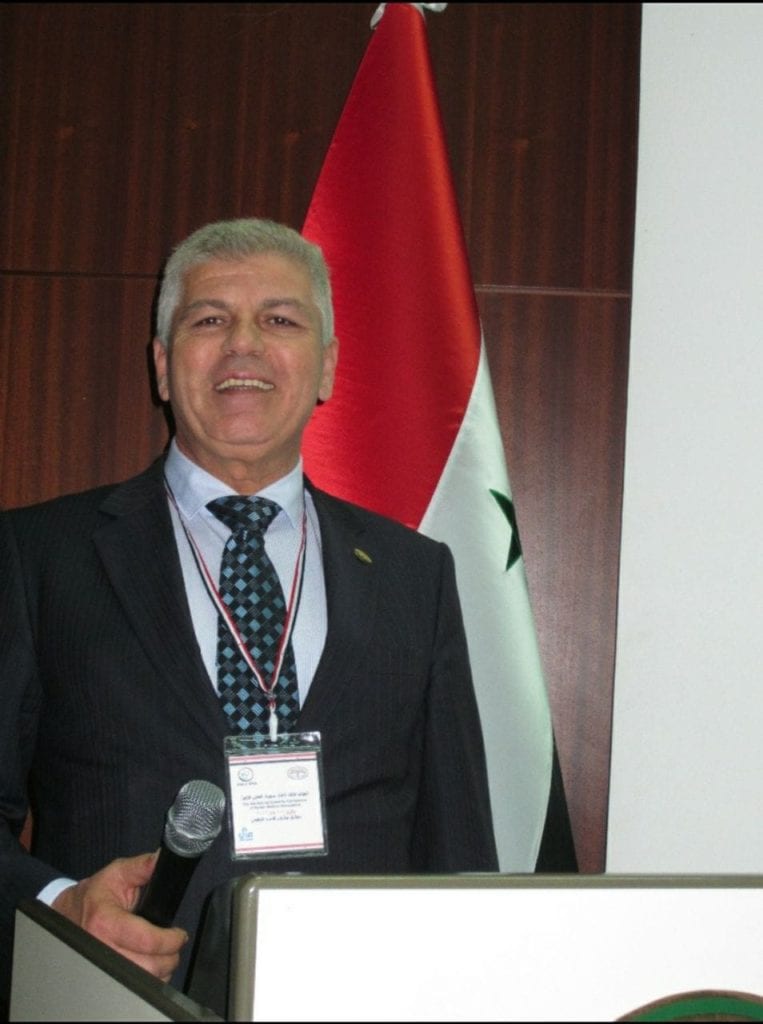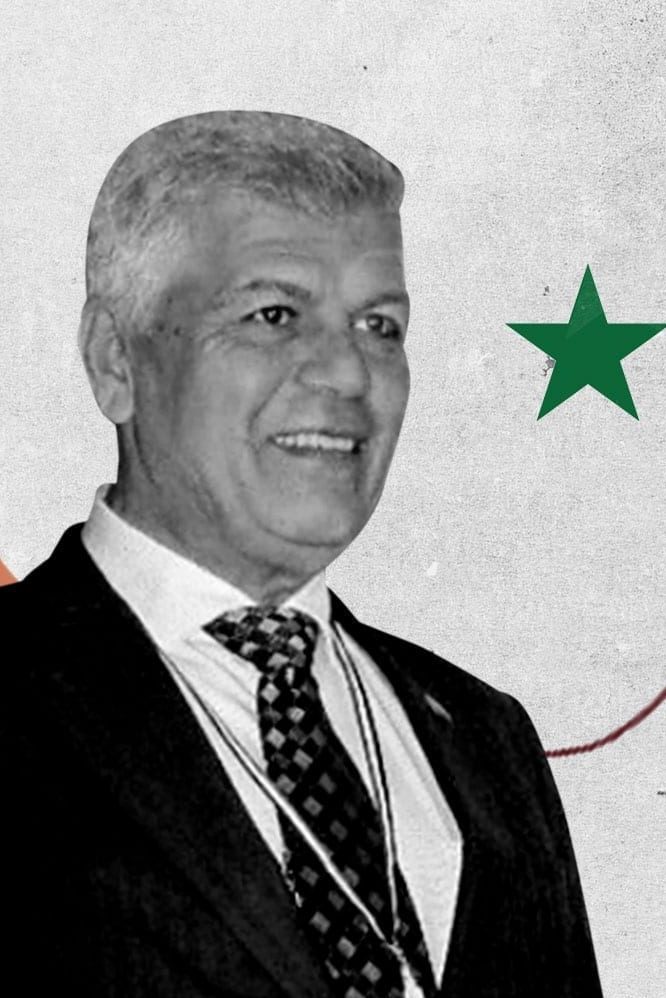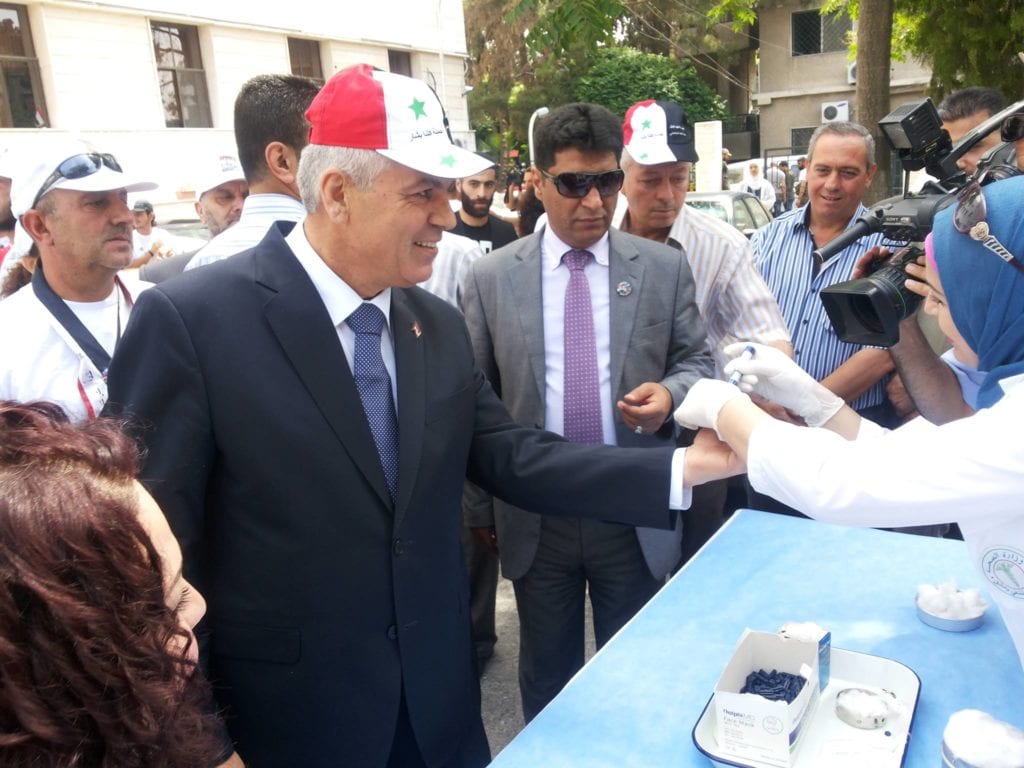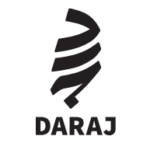“We do not differentiate between the wounded ones from whichever side they were. Suppose he is an Israeli. Of course we would treat him! He might have information.”
Words I remembered when I knew about the death of Dr. Adib Mahmoud last September. When he was Director General of the state-owned Damascus Hospital (Al-Mujtahid), I asked him about how they treat the injured protesters during the demonstrations of 2011 against President Bashar al-Assad, and he answered with that phrase.
I met him in January 2012, while I was reporting on health care services. But in secret, I was searching for a relative of mine who was shot by the regime’s army while he was in a demonstration in Damascus Countryside. My relative, whom I will not mention his name for security reasons, miraculously survived. But the authorities forcibly hid him. Then I learned that he had settled in Al-Mujtahid before he disappeared in security branches.
At the time, international reports said that the Syrian authorities turned hospitals and medical personnel into tools of repression to crush the demonstrations; and that was what I tried to examine myself.
Surgery, History and Conspiracy
On that Wednesday, I arrived at Dr. Adib’s office in Al-Mujtahid in Al-Midan neighborhood of Damascus. I was anxious because of the cold and dry weather and the noisy traffic at rush hour. I was worried that I might see my injured relative. Will I pretend that I do not know him if I see him, or will I hug him and cry?
I relaxed a bit in the building’s interior hall. When I entered Dr. Adib’s office, he was looking at a TV screen on the beige wall. He stood up and firmly shook my hand in the middle of the spacious room, while he was shifting his gaze between me and the TV screen.
He was tall with broad shoulders, short gray hair, and black eyebrows. He had a brownish skin, cold features, and strange gazes that sometimes get lost; though his black eyes seem to hide iron nerves. With a clean-shaven face, an elegant black tie and white medical coat, he seemed to be continuing his daily work.

We sat watching a live speech of Bashar al-Assad standing in front of Al-Assad Library. I felt that Dr. Adib, an attentive listener, favors politics over medicine the same way as the ophthalmologist president. His eyes were caught by the TV screen, without emotion on his face or body.
Bashar said, “When I said.. Syria is protected by God, I did not mean that we are the Lord’s chosen people; or that God distinguished Syria from others. But when God loves a land, He gives it a good, conscious, steadfast, strong and loyal people like this great people.” He continued, “[The conspirators] are in their final phase of the conspiracy, and we will make this phase the end for.”
- His supporters responded, “The people want Bashar al-Assad!”
- After Bashar finished his speech, Dr. Adib asked me in a friendly way: “What do you want to drink?”
- “Like you do..” I joked.
- He called a guy and said, “Two drinks of Zhorat [Levantine aromatic herbs].”
- We sat at a round table. Before I asked for his permission to start my tape recorder, I joked with him again by saying:
- “An important appearance for the President..”
- “Of course! A historic speech..” he said.
He also described Al-Assad’s visit to Al-Mujtahid in 2005 as “historic” in his speech posted on the hospital’s website. I was quite sure that he considers what the president says is “historic”. It seemed he was used to it since he was at high school where he finished a parachute military training that was launched in the 1980s by Commander of the Defense Companies Rifaat Al-Assad, President Bashar’s uncle, and were organized by Unit /569/ of the regular army. Those who passed one of the courses were awarded with 45 points added to their high school final exam scores out of an overall score of 240. That easily qualified the parachutists to study higher university majors, including medicine, regardless of their low academic levels.
I turned on the recorder and nodded to mark the start of the interview. Dr. Adib said, “Western and Arab sanctions have harmed the health sector.” Dr. Adib protested that allegations such as those published international organizations about torture in Syrian hospitals “are part of the conspiracy [against Syria]”.
He pointed out that on the morning of January 6, 2012, and after a bombing in Al-Midan neighborhood, Al-Mujtahid Hospital received the injured security forces members along with protestors where “they received equal healthcare without differentiation between them”. He stressed that a visitor could have found “two adjacent beds, on one of them an injured element of the security forces and the on the other an injured demonstrator”. But he continued that “The medical staff members, especially in the emergency department, are usually unable to identify the injured person before treating him”. That bombing killed 25 civilians and security forces elements and was claimed by “Jabhat al-Nusra”. The bombing took place before the Friday prayer time in front of Al-Hassan Mosque from which anti-regime demonstrations went after every Friday prayer.
Dr. Adib was speaking with a deep, low voice that befitted a surgeon and a serious manager. His body was stable and he rarely moved his hands. He repeatedly insisted on denying interference by the security forces or any other institution in the work of his hospital. “We are a neutral body. Our mission is to provide medical service. There are other official bodies responsible for ascertaining the identities of the perpetrators and holding them accountable,” he added.
Behind his brown wooden office table, was a picture of President Bashar hanging on the wall. To the right of his chair was the official Syrian flag on a huge metal stand. On that chair once sat the Chief of the Syrian Dentists Syndicate, Ibrahim Naama (1938-1977), whose assassination was claimed by the Fighting Vanguard orgazniation (FV), the military wing of the Muslim Brotherhood in Syria. By his killing, FV took revenge for the killing of its leader Marwan Hadid (1934-1976) at Mazzeh Military Prison. Upon his assassination, Dr. Ibrahim, a relative of the President Hafez al-Assad, was the director of Al-Mujtahid, a high-ranking Ba’ath Party leader, and chairman of the Syrian-Soviet Friendship Association.
Such old crimes caused incitement campaigns against the demonstrators, including those who treat them. One of the worst attacks was published by the privately owned pro-Assad Syria-Steps news website in 2011 where it stated that “Al-Hourani Hospital in Hama [is] a den to store weapons and distribute them to the [oppositon] armedmen, protect and finance them, and to kill the army and security [memebers],” and that Al-Bar Hospital in Homs is a “den for treating armedmen” while Al-Hikma Hospital, “owned by Imtithal Ghalyoun, the sister of Zionist agent, Burhan Ghalioun, head of the opposition Syrian National Council [at the time], [was] a persion for the kidnapped for the esteemed people of Homs and for mutilating corpses”.
But Dr. Adib continued, “There is no justification for the protesters to fear [about coming to our hospitals],” stressing that he has no place for differentiation between the wounded ones and that “Syrian hospitals provide healthcare to everyone, regardless of the way the patient was injured or where he was.” But I did not dare to ask him why there was a security patrol at the entrance to every government hospital in Syria even before 2011?
“We are a neutral body. Our mission is to provide medical service. There are other official bodies responsible for ascertaining the identities of the perpetrators and holding them accountable”
In the mid-2000s, pro-Assad privately-owned Addounia TV channel, accused Al-Mujtahid Hospital of organ trade. Opposition media outlets accused Dr. Adib in 2013 of illegally harvesting human organs that belonged to members of government forces and opposition protestors and selling them in Russia and Iran. Political activist Marwan Al Esh stated that Dr. Adib “opened the basement of the hospital as a detaintion center and security to which the corpses of detainees killed under torture were transferred into, and that he issued fake death certificates to them”. However, none of those sides provided concrete evidence for these accusations. But the matter became more complicated since the regime issued death certificates to thousands of detainees in its prisons, or were executed by sentences issued by military courts.
I agreed with Dr. Adib to interview wounded and injured security forces members and anti-regime protesters.But he sat another date for the interview.
An Interview That Never Happened
On the morning of Saturday January 14, 2012, I was hopeful that I would meet my injured relative. I, who was wanted by the authorities to do military service, had to cross security-military checkpoints to reach Damascus. The hospital lobby was crowded with police and security personnel. Journalists gathered with cameras and lighting equipment as if they were filming a movie. I discovered that the hospital was visited by Arab observers who had been sent by the Arab League a month earlier to monitor the humanitarian situation in Syria.
Minutes later, Dr. Adib got off a modern, dark-blue BMW, and quickly entered a waiting room and exited followed by three observers in their orange vests and white hats. He approached me apologizing, and said, “It is not the right time for interviews.”
“Should I wait?” I asked him. “If you will, but I don’t promise you anything today,” he answered.


I waited in front of his office and beside me there were two men in black leather jackets, one of whom was carrying a small camera. I asked them if they worked in the hospital, and one of them said with a smile, “We are from the archive department of the Ministry of the Interior.” I thought to myself: “In our country, everything must be archived!”
An hour later, a young doctor in a white coat came out of Dr. Adib’s office and addressed everyone, saying, “The meeting [with the observers] will take a long time.” When I asked him whether the observers would visit the wounded, without specifying whether they were security forces members or protesters, the doctor replied with a smile: “We do not have wounded today.”
Then I gave up hope of seeing my injured relative. I come on a day off and on an official appointment to meet wounded demonstrators and security forces members, and then I am told, ‘we do not have wounded today’?! Why then are all these armed soldiers in a civil hospital?!
In front of the hospital I met a friend who worked as a doctor there. He invited me for breakfast at a nearby restaurant. When I asked him about my wounded relative, his face turned white, then he apologized and left the place.
Pressures
Pressure on medical staff was enormous. Months later, the General Intelligence raided Al-Mujtahid Hospital and arrested Dr. Hayyan Mahmoud whose fate is still unknown. Last October, and in his testimony before the Higher Regional Court in Koblenz on 6, 2020, Hassan Mahmoud said that at Al-Mujtahid Hospital his brother, Dr. Hayyan, had disagreed with his colleague “E. SH” where the latter thought it was “a necessity to kill and exterminate all peaceful protesters”. Hassan added that doctors at the hospital said that “E. SH” informed the director general of the hospital about the nature of the dispute that occurred; which led to Dr. Hayyan’s arrest two days later.
Dr. Adib was the Director General of Al-Mujtahed Hospital between 2011 and 2016. Opponents to the regime quoted Dr. Adib as saying to the intelligence forces who arrived at Al-Mujtahid to disperse a sit-in organized by doctors who denounced the arrest of their colleagues, “I do not want detained doctors, I want doctors in mortuary fridges!”
From March 2011 until Dr. Adib’s death, 857 medical personnel were killed and 3,353 others were arrested and disappeared.
Over fear of arrest, torture and murder, injured protestors avoided government hospitals and relied on secret field hospitals, which are basic medical units that were constantly moving for fear of being targeted by regime forces. According to the Syrian law, all hospitals and medical points are required to inform the authorities of anybody whom they receive with a bullet injury or any type of serious wound. The authorities were not shy of announcing the storming or seizure of a field hospital or clinic nor the arrest of doctors for treating protesters.
I wrote my article and tried to get it published. But what I call the “internal watchdog of the institution”, which the regime implants in every institution, deleted Dr. Adib’s quote that “he would treat an Israeli because he might have information.”
Several days later, I learned that my relative was on the third floor in Al-Mujtahid. He passed my phone number on to a woman who was accompanying her injured brother to the toilets there.
I went to the hospital, and without the guards noticing, I spotted my relative sleeping on a bed in a back room overlooking a car repair garage. Two guards sat on the opposite bed in civilian clothes and with their Kalashnikovs. I did not dare to come forward and decided to make another visit.
The next day, while I slowly passed by the door of that room peeping, one of the guards stopped me, took my ID, held me in a kitchen and threatened to arrest me if I did not speak why I was there. When I told him, he went away and came back an hour later to release me. When I desperately asked him about my relative’s condition, he said, “We do not have a person with this name!” I later learned that when he left me in the kitchen, he went to interrogate my relative by beating and torturing him by sticking needles in his hands.
The Last Trade-Off
Dr. Adib was making his way to the political ascending. In May 2013, the Damascus Doctors Syndicate honored him for his “role in treating the wounded and injured since the beginning of the crisis that our country is facing due to terrorist groups”. Later he underwent military combat trainings and received an honorary medal from the Imam Al-Mahdi Cultural Center in Sayyidah Zaynab in southern Damascus “in honor of his social and intellectual efforts”.
His death last September surprised me where I read comments such as that he died without celebrating the graduation of “his son and three daughters” who worked closely with Asma al-Assad, the president’s wife, in her Syria Trust For Development non-profit organization, and in the Ba’ath Party institutions such as the Revolutionary Youth Union.
The stated reason behind the death of Dr. Adib is an “acute heart attack”, without specifying the location of the accident. Near his home in Al-Rawda neighborhood in Damascus, there are several specialized hospitals. His house is located opposite that of the late former Defense Minister Mustafa Tlass. Therefore, the incident is more likely to have occurred in his hometown, the poor village of Hawrat Ammourin in Hama countryside, where there is no infrastructure nor services. There is nothing more indicating about its miserable service situation than the complaint of its villagers last February about excavated roads in hope for building a sewage network.
While Informed sources confirmed that he died due to his failure in the so called “Party’s views elicit” phase or the consultations for favoring between the candidates of the Ba’ath Party for the People’s Assembly, which took place last June. In the past, the Ba’ath Party leadership used to appoint the Party representatives to the Assembly without consulting the base.
Dr. Adib did not rise in the eyes of the “leadership” despite his participation in the Ba’ath branches in honoring the wounded and injured members of the army, police and security forces, and , and his frequent visits to them accompanying his wife, dentist and Brigadier General, Hala Bilal, close to Asma al-Assad, and a member of the Interior Ministry’s injured committee. Likewise, his visits to the Russian Embassy in Damascus were useless. The same was his hosting in the hospital of the “We are all Bashar” campaign in the 2014 presidential elections and his vote with blood stamp for Bashar as an expression of affiliation and loyalty to the “Leader”.
Other sources said he was sad over failing to obtain the support of his wife’s uncle, Head of the Higher Education Office Bureau of the Ba’ath Party, Dr. Muhsen Bilal, member of the Regional Command of the Ba’ath Party.


Dr. Adib uses his blood to express loyalty to Assad in the 2014 presidential elections.
The sources who declined to be identified for security reasons added that the Bilal family support was focused on the only brother of Dr. Adib’s wife, Ayman Bilal, a lawyer and a member of the People’s Assembly for the 2016-2020 session. Ayman won a new seat in the parliament.
But it is not unlikely that Coronavirus ended the life of the man who holds a PhD in thoracic surgery. At the same period as he died, a number of medical personnel passed away due to infection with the virus. In a lecture he gave in 2014, Dr. Adib emphasized that “there are no infections with the virus (…) despite the emergence of several cases in neighboring countries.”
From March 2011 until Dr. Adib’s death, 857 medical personnel were killed and 3,353 others were arrested and disappeared, nearly 85 percent of them were targeted by the Syrian regime, in addition to the targeting of 862 medical centers, 88 percent of them were targeted by the Syrian regime and its Russian and Iranian ally, according to the UK-based monitoring group network Syrian Network for Human Rights.
All of this happened while Syria’s Minister of Health Dr.Hassan al-Ghabbash stressed that all efforts should be exerted to preserve the medical personnel, and to encourage them not to leave the country.
As for my relative, the authorities released him after nearly a year of moving between the intelligence directorates and hospitals, after which he emerged as a shadow of a human.
He told me how the intelligence members tortured him in Al-Mujtahid, where he stayed for three weeks, chained to his bed. He described to me how members of Al-Khatib Branch (Branch 251 of the General Intelligence Directorate) kicked out a female doctor who came to treat him after she asked the guards out of his room.
It was forbidden for anyone to approach his room except for the guards, the interrogators, and a doctor who would check on him for ten minutes in the morning. As for the guards, who came from Al-Khatib and from the Air Force Intelligence Directorate, “slapping me was a normal thing for them”.
My relative remembers the faces of the guards who tortured him, the medical staff, and the interrogators, as well as the face of Dr. Adib. He says that he would never forgive him if he knew or was able to prevent the torture and ill-treatment he was subjected to in the Al-Mujtahid and did not do it.






